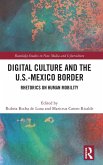Migrant Labor and Border Securities in Pop Culture explores the conditions for migrant domestic, agricultural, and factory workers as that of continual crisis and examines how the borderlands are a workshop of neoliberalism. These borderland stories present a future of integrated networks in which the border is not just physical but temporal, separating the present time of crisis and migrant phobia, and a future of transborder interaction and settlement based on bridges and networks rather than walls and the proliferation of security technologies. Written in accessible prose for undergraduate and graduate students across American studies, immigration studies, media and cultural studies and more, this book examines the collective action seen in Latina/o cultural productions after the economic crisis and how they reach across racial and geographic lines to imagine new entities.
Hinweis: Dieser Artikel kann nur an eine deutsche Lieferadresse ausgeliefert werden.
Hinweis: Dieser Artikel kann nur an eine deutsche Lieferadresse ausgeliefert werden.








